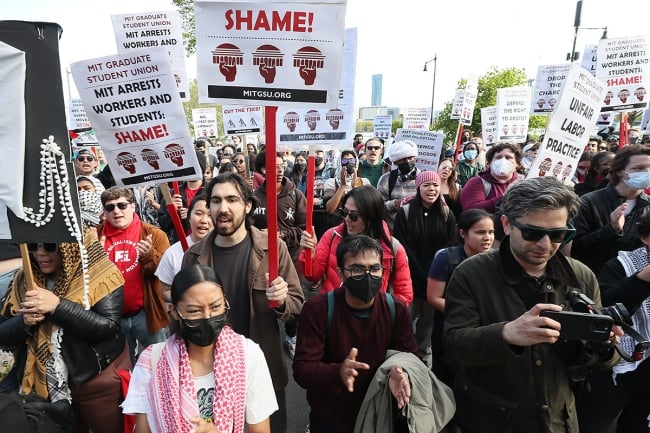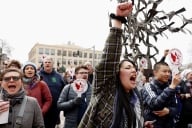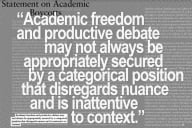You have /5 articles left.
Sign up for a free account or log in.

Pro-Palestinian protesters, some holding signs bearing the name of the MIT Graduate Student Union, chant in front of university president Sally Kornbluth’s house on May 10.
Will Sussman was elected president of the Massachusetts Institute of Technology's Hillel group for Jewish grad students in May 2023, months before the Oct. 7 Hamas attacks on Israel. At the time, he says, he had no idea that would bring him into conflict with the union that represents him.
“I was not aware that the union was going to be a problem until the following month, November," Sussman said. That’s when one of the MIT Graduate Student Union stewards occupied a building as part of a pro-Palestine protest, he told Inside Higher Ed. In December, Sussman wrote to the United Electrical, Radio and Machine Workers of America (UE), with which his grad workers’ union is affiliated, objecting to paying dues.
“The union’s involvement in anti-Israel activism sort of escalated over time, and the Jewish students who are offended by this have a very simple request, which is don’t take our money and use it against Israel,” Sussman told Inside Higher Ed.
In his written request for a religious exemption, Sussman cited his Jewish faith and the UE’s support of the boycott, divestment and sanctions (BDS) movement against Israel. He and other Jewish MIT grad workers who opposed paying dues received free legal representation from a conservative group, the National Right to Work Legal Defense Foundation, as they took their complaints to the National Labor Relations Board and the Equal Employment Opportunity Commission.
They’ve now won concessions. The foundation shared with Inside Higher Ed an NLRB settlement agreement from earlier this month that says the MIT union must tell grad workers they can object to paying for the union’s “nonrepresentational activities” and can “obtain a reduction in fees for such nonrepresentational activities.”
That likely means they won’t have to pay for any union activities that protest Israel—but neither UE nor National Right to Work would tell Inside Higher Ed on Monday how much of a savings that would be. The settlement says the union has already reimbursed one grad worker for all dues she paid after the date on which she filed her objection.
National Right to Work shared further correspondence with the UE showing that the five other Jewish MIT grad workers had won the right from the union to divert all their dues to the Israel-focused charities American Friends of Magen David Adom and American Friends of Leket Israel. The foundation summed up its victories in a news release titled “Jewish MIT Graduate Students Force Anti-Israel Union to Abandon Discriminatory Demands for Dues Payment.”
MIT isn’t the only university where the National Right to Work Legal Defense Foundation has been providing free representation to Jewish scholars who accuse their unions of antisemitism and supporting BDS and who want an uncoupling from those unions.
As in an ongoing case at the City University of New York, the foundation has used the MIT case to push for what could be a broader blow to unions beyond any one university—and beyond higher education altogether.
Last month, Sussman testified alongside a foundation lawyer in front of Congress in a hearing titled “Confronting Union Antisemitism: Protecting Workers from Big Labor Abuses.” Sussman spoke in support of the National Right to Work Act, a proposed federal law that would make it so no private employees in any state have to pay union dues for any reason—a freedom supporters call “right to work.” Massachusetts isn’t a “right to work” state.
The foundation’s president used the news release announcing the MIT wins to further push for a nationwide right to work law. “Defending basic free association rights shouldn’t require such lengthy litigation, and meaningful reforms are necessary to ensure union support is truly voluntary,” foundation president Mark Mix said in the release. “Forcing GSU [MIT Graduate Student Union] union officials to abandon their blatantly discriminatory dues practices is only the tip of the iceberg.”
Mix said, “This ordeal at MIT should remind lawmakers that all Americans should have a right to protect their money from going to union bosses they don’t support, whether those objections are based on religion, politics or any other reason.”
The UE didn’t provide interviews for this article, though it confirmed the MIT settlement and the other documents that National Right to Work provided.
In an email to Inside Higher Ed, the union focused on the foundation’s larger fight, saying its goal “is to weaken unions by undermining the principle that workers represented by a union, and who gain the benefits of collective bargaining, should contribute their fair share.” And it accused the foundation of “providing legal support to these charges as part of a broader right-wing effort to use the courts, stacked with conservative justices during the Trump administration, to undermine existing and long-standing labor law.”
A Bigger Battle
The United Electrical, Radio and Machine Workers, which has become a major player in organizing grad student workers, endorsed the boycott movement nearly a decade ago. At the time, it said it had become “the first national U.S. union to endorse BDS.”
Since Oct. 7, it has also released multiple statements criticizing Israel’s war in Gaza. In February, UE announced that it had joined six other national unions in a “National Labor Network for Ceasefire” that has called for both an immediate ceasefire in Gaza and for Hamas to immediately release its hostages.
In early May, UE joined other unions in condemning “attacks by university administrations on students and workers engaging in peaceful pro-Palestine encampment protests.” Last month, it and six other unions went further, asking President Biden to “immediately halt all military aid to Israel.”
Now, the union has become another example of a group representing scholars drawing conservative backlash for criticizing Israel.
For years now, National Right to Work has been representing a handful of Jewish professors at the City University of New York who themselves want to no longer be represented in collective bargaining by their union, the non-UE-affiliated Professional Staff Congress. These professors have taken issue with what they say are chapter-level union discussions encouraging support for the BDS movement.
The foundation is waiting to hear whether the U.S. Supreme Court will take up that case, which has so far been unsuccessful. Unlike the MIT case, dues are not at issue in that lawsuit because, at public universities such as CUNY and at other public employers, employees have been allowed to opt out of paying their union dues ever since the 2018 U.S. Supreme Court decision Janus v. American Federation of State, County and Municipal Employees. The CUNY professors are trying to go further by freeing themselves from being represented by the union in contract negotiations over what they are paid, what benefits they receive and other employment matters.
In the foundation’s fight against the UE-affiliated MIT union to opt Jewish grad workers out of paying dues, it has pointed to the 1988 decision Communications Workers of America v. Beck. In that case, the majority of justices held that federal law “does not permit a union, over the objections of dues-paying nonmember employees, to expend funds collected from them on activities unrelated to collective bargaining activities.”
The foundation also pursued, with the Equal Employment Opportunity Commission, charges that the Jewish MIT grad workers were facing discrimination under Title VII of the federal Civil Rights Act.
On Feb. 8, Andrew Dinkelaker, general secretary-treasurer of the UE, signed a letter to Sussman saying he was denying the student’s requested exception because “no principles, teachings or tenets of Judaism prohibit membership in or the payment of dues or fees to a labor union.” The letter said Sussman’s objection is “based on your political views and not your religious belief.”
“If I say they’re religious, it’s up to me and only me to decide what I believe in,” Sussman told Inside Higher Ed. “So it’s not up to the union to question my religious beliefs. I have a First Amendment right to religion and that’s that.” He said he has read what scholars have said about BDS, “and I found it convincing” that it’s antisemitic. The union eventually capitulated.
Now that Sussman has won, though, he’s not done advocating for the National Right to Work Act. He said he thinks Republicans in Congress reached out to his attorneys from the foundation to set up his appearance at last month’s congressional hearing, during which he advocated for the law.
“I’ve become convinced, despite the fact that I’m a registered Democrat, a liberal New York Jew … I’ve become convinced that a National Right to Work [law] is the right answer,” Sussman told Inside Higher Ed. “I don’t think people should be forced to pay an organization that is directly opposed to their interests.” He said, “It’s only at private institutions in non–right to work states that we have this problem.”
“They are protesting a war overseas in lieu of fighting for better wages and benefits, which is something that everyone should agree on,” Sussman said. “Why waste the political and actual capital … on something that divides us when the whole point of a union is to unite us?”
Asked if he feels he’s being used to advance conservative, anti-union legislation, Sussman said he thought about that. But ultimately, he said, “I think that this is a moral issue that transcends party, and only one party has held hearings on antisemitism, and it’s not mine.”
Sussman gave a prediction. “When the anti-Israel groups get shut down not for their speech but for their conduct, I think the last ones standing will be the unions because they have special legal status and they can’t be shut down,” he said. “And so I think what we’re going to see over this next academic year is the anti-Israel protests at all of the universities are going to be union protests.”








